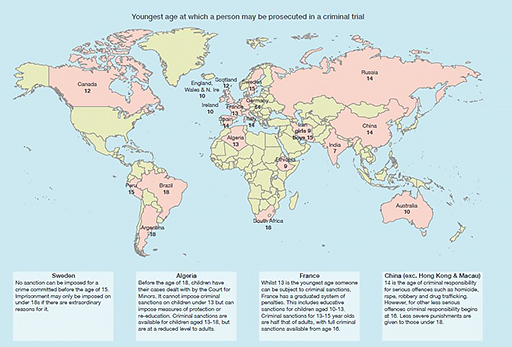4 Taking court action
The idea of taking a child to court is controversial not only because the consequences can be so serious, but also because the procedures of the court and the rules of legal practice can be very complicated. The criminal court, as Bandalli mentioned, has to rule on what happened – in Latin, actus reus – and on the intention of the child at the time of the act – in Latin, mens rea. The child will be found guilty or not guilty. The inevitable and unavoidable differences between one child and another as they grow and mature with age means that it can be very difficult to apply these rules fairly. Many other countries take a more cautious approach to putting children through these complicated procedures than do the jurisdictions of the UK. You can find out more about these complicated procedures in the next activity.
Activity _unit2.5.1 Activity 4 Trials of youth
Listen to this extract from the BBC’s Law in Action radio programme.
Transcript: Audio 1
The presenter Clive Coleman mentions two countries where the age of criminal responsibility is higher than 10. Make a note of them, and the ages they have set, then with the help of a search engine find the ages set in Italy, Norway, Spain and France. You may have noted the reference to Scotland’s age as 8 rather than the current 12. The programme was recorded in 2009 and the change since then indicates how things may be changing in the UK. Looking at the following map, you can see how the age varies across the world.
In the map you can see the age for some European countries. Use an internet search engine to find the age of criminal responsibility in as many of the other European states as you can and enter them into the table below.
| Age 10 years | Age 12 years | Age 13 years | Age 14 years | Age 15 years | Age 16 years | Age 18 years |
Discussion
Compare your answers to those given in the table below.
| Age 10 years | Age 12 years | Age 13 years | Age 14 years | Age 15 years | Age 16 years | Age 18 years |
England Wales |
Netherlands Turkey |
France | Austria Bulgaria Cyprus Estonia Germany Hungary Italy Kosovo Latvia Lithuania Spain
|
Czech Republic Denmark Finland Greece Norway Sweden
|
Belgium Luxembourg Romania
|
Being taken to court is a frightening business for anyone, but especially a child. Nobody really enjoys being judged, and if you recall the image of justice in Figure 2 where the blindfolded woman holds a sword, you realise this feeling is intentional and part of the process. The court has power, and in some cases an awful lot of power. Many other European countries refrain from using the powers of a criminal court until much later in a child’s life. This doesn’t mean that nothing happens when a child in these countries behaves badly or does something wrong or harmful. It means they prefer to use other systems of intervention to respond, establish what happened and decide what to do about it.
England and Wales appear to be a significant outlier among European jurisdictions in having an exceptionally low age of criminal responsibility. The activity in the next section helps you to consider why being so out of step with the way other countries respond to children’s problematic behaviour should be a matter of concern.

